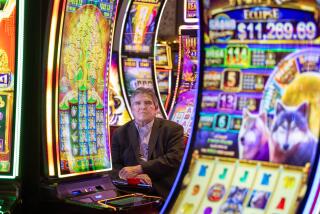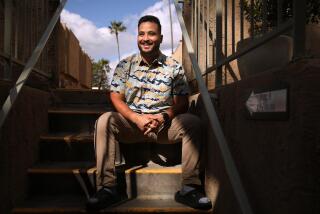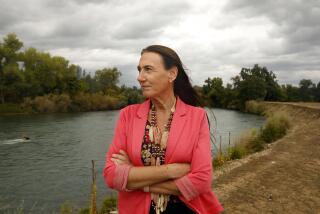Fastest Growing Game of Chance in State : Bingo Organizers Bet on North Dakota
- Share via
FARGO, N.D. — Bingo, once a quaint game played in church basements and fraternal clubs, has become such a big business in North Dakota that one city has started cracking down on bingo parlors.
Bingo is the fastest growing of a variety of games of chance that the state has allowed charitable organizations to run in the last decade. But there is some concern that gaming has encouraged problems ranging from cheating and theft to excessive gambling.
The bingo action attracts players like Merrlyn Meland, a 58-year-old widow from Moorhead, Minn., just across the state line from Fargo. She comes to Fargo three or four times a week for the prospect of big money, prizes and companionship.
“I think a lot of it is just to get away from the house,” she said during a recent session. “I can’t stand being around that place. I have to get out where there’s people.”
Finds Company
Meland finds plenty of company at Big Top and Prairie Public Broadcasting, which operate the largest of Fargo’s five bustling bingo parlors.
Prairie Public, the network for the state’s public radio and television stations, has had as many as 490 people playing in its modern facility, which sports electronic scoreboards and video monitors. Prairie Public uses the funds from its gambling operations to run its broadcasting operations.
Bingo, raffles and pull tabs--a paper simulation of a slot machine--were the first games introduced 12 years ago after North Dakota allowed gambling for charitable purposes.
Since then, sports pools, pari-mutuel horse racing, blackjack, poker and video poker have been legalized. Ironically, voters have rejected a proposed lottery.
In June, 327 organizations held gambling licenses at 576 sites across the state. State regulations list more than 100 ways charitable gambling proceeds may be used, including broad categories of educational, religious and fraternal activities. Eligible uses also include a category called “other.”
Among the organizations supported by bingo or other gambling revenues are Bishop Ryan High School in Minot, a Roman Catholic school; the Red River Dance and Performing Company in Fargo; and the Souris Valley Humane Society.
Wager $205 Million
Overall, gamblers wagered a record $205 million last year, with $18 million going to charitable groups. The state also gets a cut, with taxes ranging up to 15% of revenues and sales tax charged on bingo cards and some other gaming items.
The revenue is welcome in a state with a troubled farm economy. But there are also worries that gambling has brought other problems to the state.
Recently, the Grand Forks City Council voted to limit the number of bingo parlors.
Social problems are evident in the number of groups like Gamblers Anonymous, said Nicholas Spaeth, the state’s attorney general.
“Ten years ago, you couldn’t open up a newspaper in the state and find such a group,” he said. “But now there isn’t a major city in the state that doesn’t have one.”
Theft Becomes Problem
Cheating and theft also have been a problem, although how much goes on is hard to determine, Spaeth said.
Still, bingo is still accepted in most places outside of Grand Forks.
Charities operating the games do not express any qualms that they may be encouraging excessive gambling. Spaeth said he expects the bingo business--which grew 28% in 1988 to a total of $41.1 million--to keep growing.
“It’s the lure of the big jackpot that draws people in,” he said.
Prairie Public, the biggest bingo operator with revenues of nearly $8.5 million last year, offers nightly prizes that include a car and a $20,000 payout to anyone who blacks out a card in 50 numbers or fewer.
More to Read
Sign up for Essential California
The most important California stories and recommendations in your inbox every morning.
You may occasionally receive promotional content from the Los Angeles Times.













